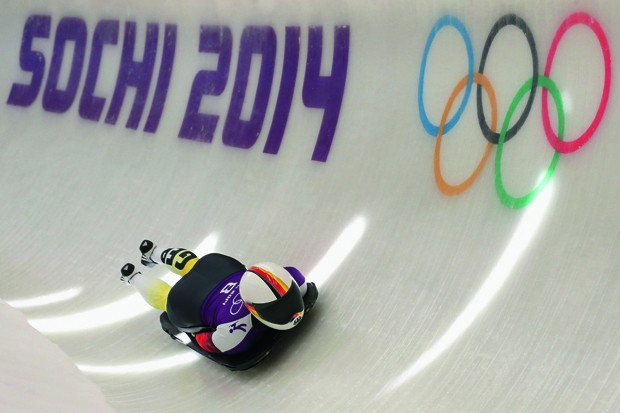Call me sentimental, but I’ve never seen a better opening ceremony than the Sochi one, evoking Russia’s great past in literature and in many other things. The ballet sequence was tops, especially the acrobatics by the black-clad dancer portraying the cruel officer in War and Peace who seduced Natasha. All those hysterics about boycotts and terrorism, they were just hypocritical sensationalism by those PC jerks that seem to be running our lives nowadays.
We westerners are averse to any discipline, impervious to duty, and disinclined to belong to a nation. We owe allegiance only to ourselves and love only ourselves. Not so over in Russia, where there’s a mystic connection between the nation and every single man and woman born there. Never underestimate the love of Russians for the land of Pushkin and Dostoevsky and Tolstoy and Chekhov. I could go on and on. As it happens, I’m reading Brian Moynahan’s Leningrad book, reviewed in The Spectator last month. The gallant Wehrmacht troops couldn’t believe the ferocity of the defenders. And all the time, while starving and dying in the bitter cold but bravely resisting the Germans, Stalin’s evil agents were arresting and shooting innocent people for slights towards the regime, real or imagined.
I’ve always insisted that, had the Nazi machine following the Wehrmacht blitzkrieg acted in a humane manner in Ukraine, the Russians would not have fought as fanatically as they did, especially in Leningrad and Stalingrad. Now I’m not so sure. Borodino in 1812 was actually a tie, and Napoleon’s troops committed no atrocities, yet the Russian soul resisted and it was a soul that had known only enslavement. When black American grunts shot their officers in Vietnam, the usual suspects gave them the benefit of the doubt, using past slavery as the excuse. So what were the Russians? Free men, when they burned Moscow in retreat but finally chased the great Napoleon back to Paris?
Modern man has no past and certainly no future. He is uncivilised and unaware of his noble traditions. He is no patriot, but bows to the edicts of grey suits in Brussels as long as they promise him a life of ease, which is in itself the big lie. Modern man has no religion, no loyalty, no family, just a desire to please himself. Modern man has been indoctrinated to owe ‘nobody nothing’, except to the Third World. Which brings me back to Russia.
Why were the media so anxious to paint Russia as a brutal authoritarian state with a modern Stalin at its head? A moron in the NY Times quoted the father of four terrorists whom the security services had correctly blown away the day the games were starting 180 miles away, thank God, as if he were Moses and had just come down from the Mount. The Sochi games are being held on the edge of a war zone where Muslim extremists operate, yet the media concentrate on gay rights that are respected in Russia although hardly applauded. My question is, why doesn’t Stephen Fry ask for boycotts against anything from Saudi Arabia or Nigeria, where homosexuality is punished by death? I’ll tell you why, because criticising Muslims might get his head blown off, cut off rather, and Nigerians are black, hence above criticism and boycotts. In Nigeria, corruption, top to bottom, pervades life and it is getting worse, not better. Saudi Arabia, of course, enslaves foreign workers, stones adulterers, sticks women indoors, but it’s Putin we go after, week in and week out. In 1980, Uncle Sam boycotted the Moscow Olympics because the USSR had invaded Afghanistan; 22 years later Uncle Sam copied the Russian bear, so go figure.
Another thing the West cannot abide is Russia’s turn towards Christianity since the collapse of Godless communism. Our élite view this as a backward step, Christianity being our favourite whipping boy nowadays. The big corporations, of course, are anti-Russian and anti-Putin because they’re refused total access to the land’s mineral wealth and natural resources. Russia is not Guatemala and does not sell her lands to western investors. The big crooks, as in oligarchs, are already settled in the West — Britain, France and Israel. They took everything they could, laundered their moolah and are now our problem, not Russia’s. We bow and scrape to these barbarians the way we bow and scrape in front of the Saudis and Qataris, camel drivers who should never be allowed on European soil because of their human rights violations back home against minorities, women, gays and foreign workers. Yet it’s Putin who wears the black hat.
Oh yes, I almost forgot. Baroness Ashton, the EU’s foreign minister, I believe (although as with all cons the EU uses different phrasing), is pissed off with Putin and his leaning on Ukraine to stop it from listening to the EU’s siren song. Russia is a great power and is looking out for her interests. How dare she? Let’s face it, the EU is the greatest con ever perpetrated, as is the hypocrisy involved where the winter Olympics and Sochi are concerned. As of writing, the games have been a great success and all the naysayers have been proved wrong. Next week I will be Emil Zola, without the talent, and tell you how class warfare and the British judicial system have railroaded a member of the aristocracy in a manner reminiscent of the Soviet Union.







Comments